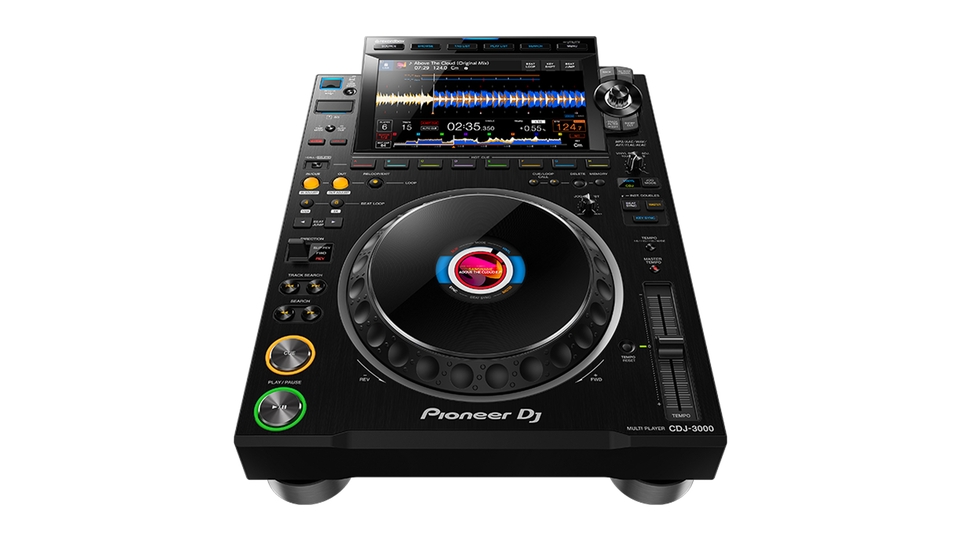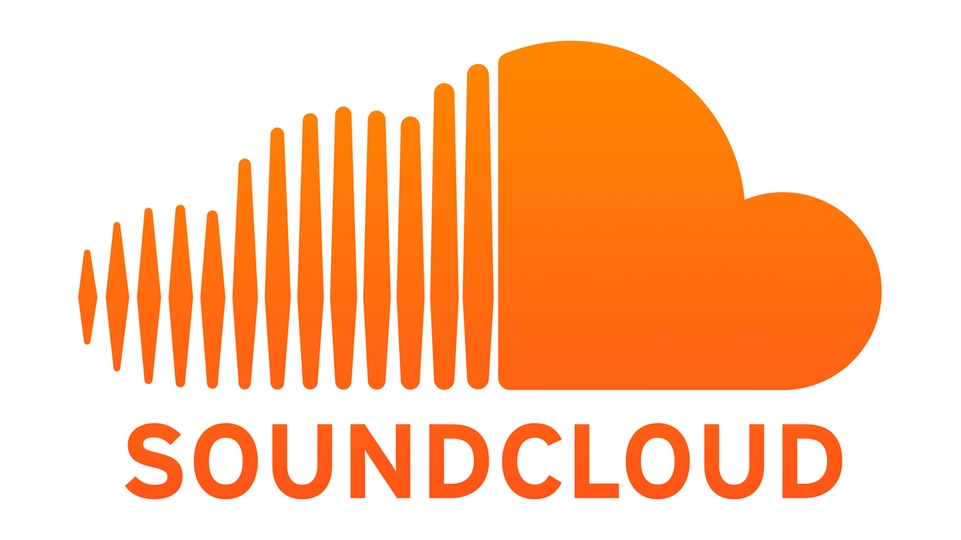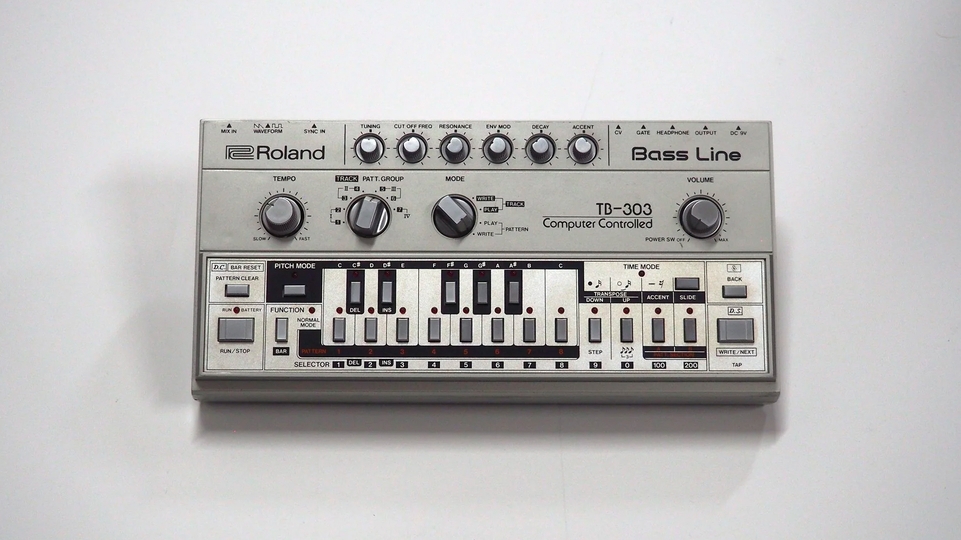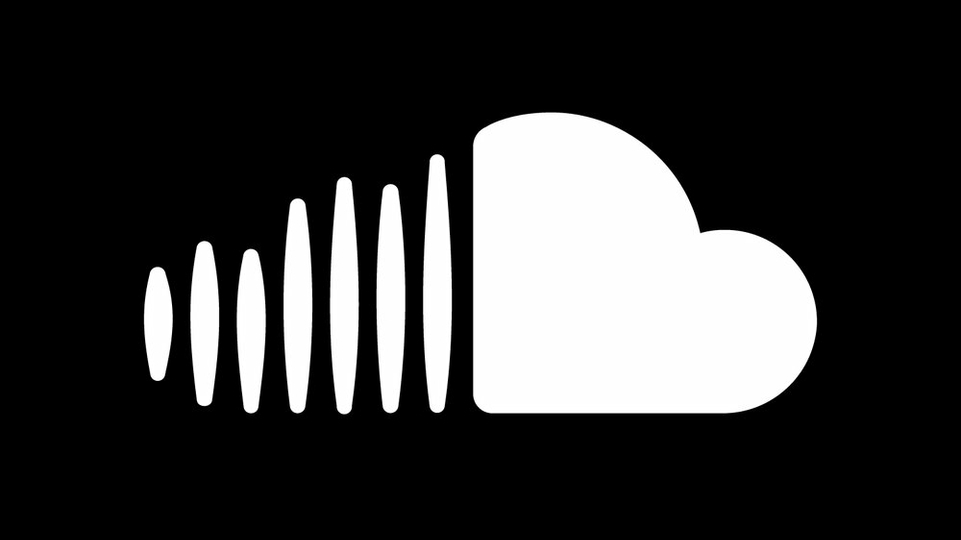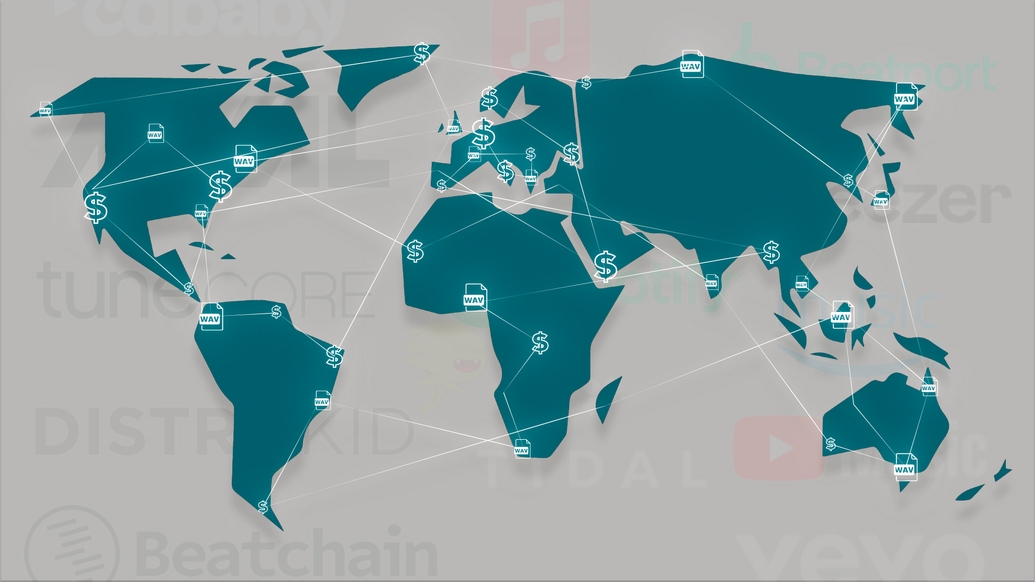
Self-releasing music in 2022: which distributor is right for you?
When starting out in the industry, musicians and producers have what can often seem like an insurmountable number of new skills to learn outside of making music. With seemingly countless distributors offering widely varying features and products, choosing how to get your music on streaming services can be confusing. This guide seeks to demystify one of the most confusing aspects of releasing music
Digital distribution is the process of releasing your music to various digital streaming platforms (DSPs) and services. In the past, distributors would take care of physical releases — CD, tape, vinyl etc — and that’s still the case, but for the purposes of this guide, we’re going to focus on digital distribution only. We’re also largely looking at open distributors that (almost) anyone can use. There are others like The Orchard and Believe who are pickier about who they let on their platform, but this list is open to anyone, bar AWAL, who we wanted to include as an example of what these types of platforms offer.
There are many different distribution companies who take care of different aspects of the process — with varying fees and percentages — but ultimately their job is to take your music, release it on the platforms you want to be released on, and track how people are interacting with that music. They’ll then pay out what you’re owed based on the streaming rates of each platform.
While the destinations will largely remain the same for most distros, how it happens, how easy it is, how fast it happens, how much it costs and what communication and interaction you’ll get on how your music is performing can differ wildly. Some offer extra services such as publishing and YouTube monetisation, while others offer excellent analytics around how to track your music across platforms, demographics and locations.
You might be wondering, why do I need a distributor at all? Can’t I just upload my music to platforms myself, as I do with SoundCloud and Bandcamp? Though many have experimented with the concept, ultimately, DSPs don’t want the headache of dealing with artists directly, which can result in a lot more support questions, missing metadata and artwork and general problems that slow down the well-oiled DSP machine. With correct release dates and information vital to labels and artists, DSPs would far rather hand over that responsibility to third parties, and allow them to take a cut as a result. Spotify toyed with the idea of user uploads, with a beta period that lasted for over a year, but ultimately canned the project in favour of ‘partners’.
There’s also the fact that many distributors will upload your music to over 100 platforms on the same date and time. Doing this yourself could result in a large amount of time spent manually uploading files, artwork and metadata, which is less time making music and being creative.
Finally, there’s the issue of ISRC codes, which are the digital barcode for your music. These can be used to track streams, downloads, monetisation across YouTube and any other (legal) use of your music online. Distributors will issue you with an ISRC code per release and when you register your work with your country’s PRO (Performance Rights Organisation) you enter this code so that the PRO can track the music’s use. Alternatively, you can create your own ISRC through your PRO, and enter it when uploading your track to a distributor, which comes at a cost. It’s only worth doing this if you are a label or are releasing a lot of music across the year — more than 10-15 releases. Otherwise, you can just use the distro’s code.
As you probably know, Beatport is the world’s largest electronic music download store. More recently they launched Beatport LINK, which is their streaming and cloud DJing platform that integrates with leading DJ software like rekordbox DJ and Serato DJ Pro. Both Beatport and Beatport LINK work with third-party distributors, but many don’t upload to Beatport by default due to Beatport’s own rules around what can be accepted — essentially, electronic music only. Beatport uploaded their own audio examples of what’s likely to be accepted here.
It’s worth noting, too, that Beatport recently acquired ampsuite, a distribution and artist and label services platform. It can take care of everything from DJ promos to accounting and, of course, distribution. It’s not open to all yet, and you can apply here, but perhaps that will change in the future.
With all of that in mind, choosing the right distributor can still be a confusing decision. Really it depends on what’s important to you. If you’re just starting out it can be appealing to choose a distro that costs less up front and takes more commission. That’s a fair strategy at least in the short term, but there are other considerations to take into account too, one of the most important being analytics. Analytics is essentially the data that you are provided about who is listening to your music, where they are in the world, and any other info about demographics, top listeners, playlists you’re on, playlists you could be on, and reams of other data that can help you understand your fanbase and inform your marketing and even touring strategy outside just the streaming platforms. Some distros do a better job of contextualising and aggregating the data than others, with LANDR, Beatchain and SoundOn being three good examples. Again, maybe data means nothing to you and you’re more interested in brand partnerships, playlisting and keeping the cost down — few distributors are bad, it’s just about what you want for your music.
Below, we’re going to take a look at some of the main distros and some of our favourites to give you a broad view of what you can expect, how much it’ll cost, and what distributor might be the one for you.
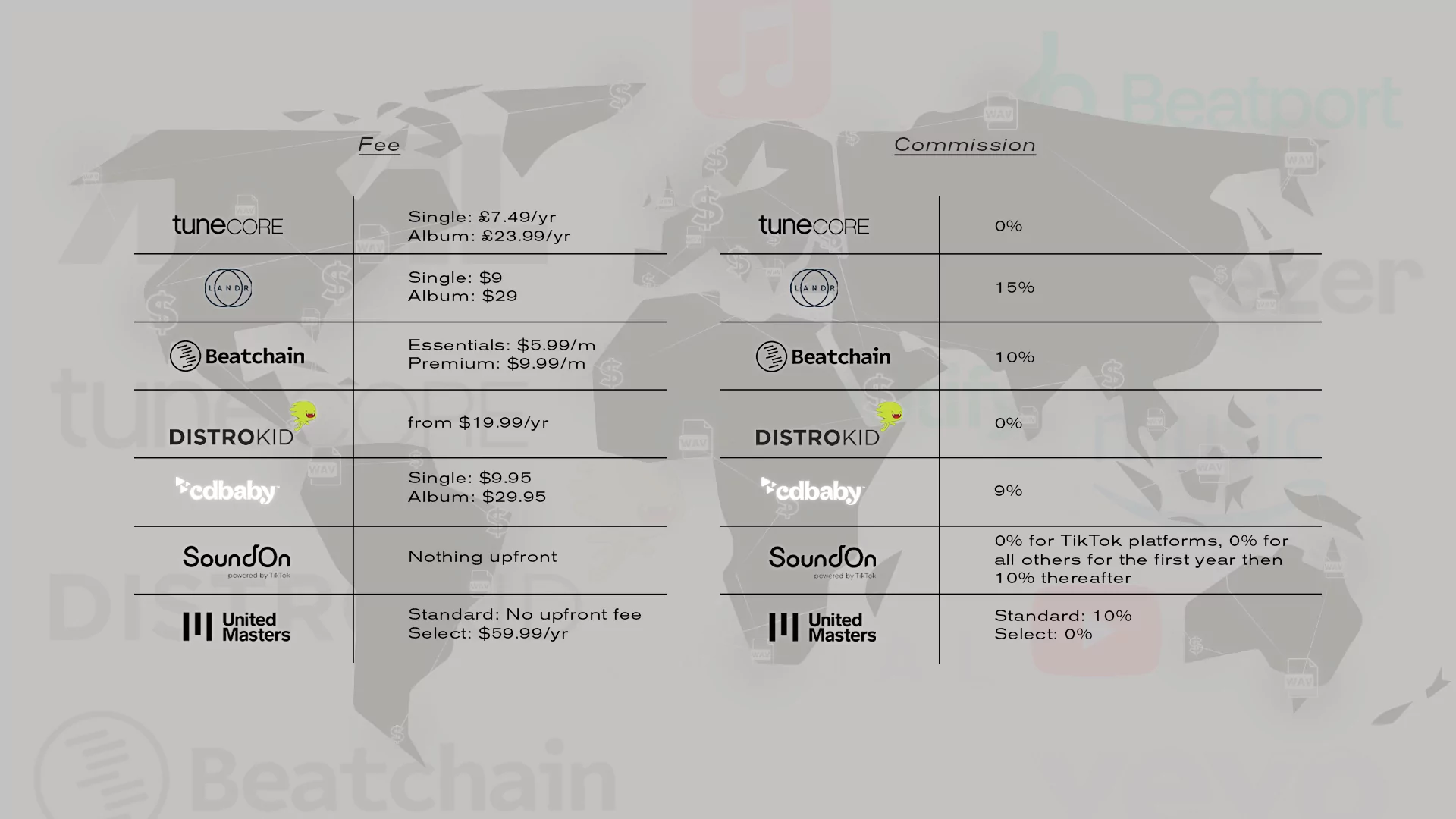

Founded in 2006, TuneCore was one of the first platforms to allow artists to independently release their music on download stores. Still one of the leading platforms for distribution with in-depth analytics and heaps of extra artist services and initiatives. It’s now owned by digital distribution powerhouse Believe.
What do they charge?
TuneCore charges £7.49 per year for a single and £23.99 per year for an album and takes no commission. It’s a pretty good deal if you’re only releasing a few tracks a year, but if you’re planning multiple albums, it could soon add up. Those fees are for every year that the music is active on streaming services, so it could get into the hundreds of pounds after a few years.
However, if all you want to do is get your music on social platforms like YouTube, TikTok, Facebook and Instagram, and not on Spotify, Apple Music, TIDAL, etc, TuneCore will take no annual fee, but they will take 20% of royalties.
Pros:
- Social-only distribution offering
- Strong analytics
- Publishing and social management offering
- Zero commission
Cons:
- Set fee every year for every release
- 20% commission on YouTube royalties
Independent music’s largest distributor, CD Baby, as the name suggests, has been around for a while. In fact, it’s been around since 1998 when independent musician Derek Sivers founded it to sell his own music. So it has independent roots, making it appealing for DIY musicians and its customer support reflects that. It also pays out weekly, reflecting the need for independent artists to receive regular payments to sustain a living. They haven't lost their physical origins either, and can offer vinyl and CD distribution if required.
What do they charge?
It’s a one-off fee of around $10 for a single, with a 9% commission — not amazing, not extortionate, but they’ll also collect all publishing royalties on your behalf.
Pros:
- Great relationship with Apple Music and detailed analytics
- Quick payments (weekly)
- Pro version provides more services
- Extensive tutorial and learning content
Cons
- YouTube monetisation royalties are 30%
- They take 40% of any sync
As of January 2021, Distrokid claimed to have serviced 33% of all new digital music around the world. A bold claim for the distro powerhouse, and not without reason — it offers a huge swathe of services for a very competitive price. It also takes zero commission, a huge win if you’re concerned about your music blowing up in the future.
What do they charge?
They charge $19.99 a year in total, for one artist to upload unlimited music. If you’re a solo, DIY and self-releasing producer, this is a great deal. You can also operate as a label, paying more to add each artist up to 100 for $1,199 a year. It’s worth noting though that if you stop paying the subscription cost, your music could disappear from DSPs.
Pros:
- Fixed price for unlimited uploads
- Automatic Spotify verification
- Zero commission
Cons
- Music can disappear if you stop paying the subscription
- Basic plan can’t specify a release date (Musician Plus plan required which is $35.99 a year)
- Fee and 20% commission for YouTube monetisation


You may know LANDR as the company that introduced AI mastering to the world. Since then they’ve grown substantially, adding other tools like samples, plugins and, of course, distribution. Given they’re newer to the market, they’ve opted for a subscription model that covers almost all of their tools, so you can release your music, use their mastering services, have access to samples and plugins and even use their high-quality lossless collaboration services. You can of course pick and choose what you want for a lower price.
What do they charge?
There are many options for LANDR given the number of services you get access to but if you just want distribution, it costs £9 for a single, which is considered one-to-three songs, 15% commission but with no annual fee. There’s a range of alternatives depending on how much you want to release and how interested you are in their other services, with commission and upfront fees changing depending on the plan. Find the full rundown here.
Pros
- Lots of extra services for an additional fee per month
- Quick upload to stores (One to three days)
- No annual fee for just distribution
Cons
- 15% commission for distro only
- Lots of varied pricing options can be confusing
Beatchain is also very new to the game, and we covered them when they launched back in 2020. They offer a whole range of services, including some innovative ad builders for socials that can use your streaming data to better build more targeted ads. They also offer a social media scheduler, LinkTree-style ‘hypelinks’ and strong analytics. They’re one of the most impressive we’ve tried for building a career and keeping track of all your analytics in one place, in a way that makes sense and contextualises the data. If you find various Ad Managers on Facebook and others confusing, definitely check out Beatchain. They also provide an artist incubation programme called DSCVRD.
What do they charge?
There are two tiers — Essentials and Premium. Essentials costs $5.99 a month while Premium is $9.99. Both offer unlimited releases, but Premium has more insights into playlists, but really there’s not a huge difference. They take 10% commission.
Pros
- Get insights into what playlists you’re on and what playlists you could be on
- Build ads for socials using streaming data
- Affordable
- Unlimited uploads per month
Cons
- None at this price
Recently revealed from the team at TikTok, SoundOn is their new distribution platform that offers zero fees and zero commission when releasing to TikTok and other streaming platforms, via TuneCore. The no upfront cost and no commission may seem too good to be true, but it is indeed the case — the only catch is that after 12 months, commission rises to 10% for platforms outside the TikTok ecosystem. That means you can release music to Spotify and Apple Music for free for a year. Can’t argue with that. SoundOn will also upload your music to their commercial library, which means creators, brands and businesses on TikTok can use your music in their videos, providing you with more royalties.
What do they charge?
As we’ve mentioned, SoundOn is free for a year, with 10% commission for services outside of TikTok after 12 months. No upfront fee, and they’ll even generate an ISRC number for free too.
Pros
- No commission for 12 months, or at all if you only use TikTok
- No upfront fee
Cons
- It's free so – none.


Finally, it’s worth mentioning UnitedMasters — up until the launch of SoundOn they were TikTok’s official partner and are also the partner of a bunch of brands including the NBA, Bose and the NFL. Though it only launched in 2017, it’s very much an all-encompassing distributor, looking to service more than just music to DSPs. Their team is built to help you connect with brands and to push your music beyond the noise of weekly tracks pushed to streaming services. They also offer excellent analytics, social media tools and the ability to create your own website.
What do they charge?
UM’s pricing is pretty simple — no upfront fee and 10% commission for their basic plan and $59.99 a year and zero commission for their Select plan. Artists on the basic plan get one release per month, while Select gets unlimited releases, brand partnership opportunities, split payments and more. If you’re going to use UM at all, it’s worth using their Select plan.
Pros
- Build around developing brand partnerships
- Excellent analytics
- Useful app
- Qualifying artists can request an advance
Cons
- Not as suitable for new artists starting out
Distribution can be a confusing space. Comparing prices can be confusing, even within one platform’s own offering, and once you start to compare multiple platforms’ pricing and services, it can be enough to put you off completely.
Rather than comparing packages directly, it’s better to ask yourself some fundamental questions about your music. Is keeping 100% of royalties important to you? Do you see yourself sticking with the same distributor in the long term? Do you intend to use streaming analytics to inform your decisions and next steps as an artist? How important are services like artist incubation and brand partnerships to you?
How you answer these will dictate which platforms appeal to you and how you justify the price of each. Hopefully this guide has offered some help on the journey to your next release.
